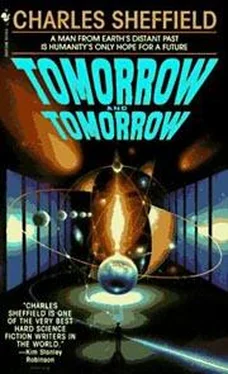Ana went across to the table where she had been working, returned to Drake’s side, and handed him a drink. “Here. This should help for starters. I told you there would be temporal shock, and I was right. It just took a while to show up. You sip on that, while I order something as close as this crazy chef can manage to the foods you were raised on. And for tonight, I think we’ll manage with a little less Europa. I’m going to dim the lights and close the ship screens. You can
sit there and imagine you’re safely back on good old Earth.”
She could not have known it, but long ago, back in the happy days that Drake had not even allowed himself to think about, Ana had done just the same thing when he was upset. She took over. She was strong when he was weak, obligingly weak when he felt strong.
Drake did just as he was told. They ate a full, leisurely meal, with Ana doing almost all the talking. The chef provided a reasonable shot at the foods and even the wines of Old Earth. Finally, Drake could begin to relax and probe the cause of his problem. It was not rational, but he realized that it was the sounds of Europa. He could not rid his mind of them. Others might hear nothing but moving ice floes on a changing moon. He heard tormented groans, and the agonized death cries of ice demons.
“You have too much imagination,” Ana said firmly, when he told her about it. “One day you will have your reward. All this will turn itself into music.” She switched off the lights, lay down next to him, and cradled his head against her breast. He hid himself away in the perfumed night of her long hair.
It was natural, perhaps inevitable, that they would become lovers that evening. Neither of them realized that Drake, deep inside, thought of it as “lovers again .”
“And I was desolate and sick of an old passion.”
Physical euphoria carried everything before it, all the way into the inner solar system. Lovemaking, as always with Ana, provided an epiphany for Drake. As an antidote to temporal shock it could not have been better. Immersed in the familiar touch and smell and taste of her soft body, he would have seen Earth and Sun destroyed with equanimity.
It was not quite that bad, although four thousand years earlier the Earth had come close.
“A disaster?” Drake looked around at the place where the ship had landed. They were on the winter edge of a diminished Antarctic ice cap. In his time, nothing had grown on this rocky shore. The only animal life in June and July had been the emperor penguins, huddled over their eggs to protect them from the fifty-below-zero polar blizzard.
Now a gentle rain was falling, and the air was filled with calling seabirds, skuas and petrels and albatrosses and terns. Rank grass and flowering plants flourished along the salty margin of the beach. Plovers and curlews were nesting there in enormous numbers.
“It doesn’t look like a disaster,” Drake added. He and Ana were strolling along the shore, bareheaded.
She paused and skipped a flat stone over the brackish waters of the estuary. “Believe me, it was.”
“What caused it?”
“The usual: stupidity. We still have our share of that. The old assumption was that Earth’s whole biosphere had strong homeostasis. Disturb it, no matter how, and forces would come into play to restore it to its original condition. So while everyone was looking the other way, not worrying about this planet and wondering what to do with Venus and Europa and Ganymede and Titan, Earth started an environmental runaway.”
“Runaway how?”
“Temperature, mostly. The atmospheric composition was starting to change, too, but the biggest problem was greenhouse warming. It was caught before it could go too far. Turning it around was another matter. For a while, people were imagining a new homeostatic end point, with temperatures hot enough to boil water.”
Drake stared out over the peaceful estuary. “Hubris,” he said, in English.
“What?”
“Too much arrogance; the belief that you can do anything.”
Ana stared at him. “Anything, no,” she said at last. “A lot, yes. Recovery has been slow but steady. Mean equatorial temperatures are below forty degrees Celsius. The land animals are heading out of the temperate zone jungles, and they’re traveling sunward. Don’t worry, we’ve learned our lesson. This won’t happen again — ever.”
“I’ve learned not to trust ever .” Drake looked north. “We used to live in a place called Spring Valley. If I tell you how to reach it, could we go there?”
“Were you living up in the mountains, or close to sea level?”
“Down right at the shore.” Drake did not notice the change Ana had made, from “we” to “you.”
“Then we could go there, but it would be a waste of time. I don’t just mean the heat — suits would take care of that. But sea levels are up. Your old home will be under five to ten meters of water. Come back again in ten thousand years. The sea level should have dropped enough for you to pay a visit on dry land. But if you’d like to visit mountains, I have my favorites.”
“You’ve been to Earth before?” It seemed like a ludicrous question — his Ana had been born and raised on Earth.
But she just nodded. “Five times. It’s a backwater, but it’s on every tourist list. The original home, the birthplace, the shrine of humanity. But if most people were honest, they’d admit that it’s rather dull. It’s not where the action is. Are there other things that you want to see?”
“My old mentor, Par Leon, lived deep beneath the African plateau. That was high above sea level. I know the location. If we could just fly over there …”
“Of course.”
Ana agreed readily, although she must have suspected what they would find. Africa, at ten degrees north of the equator, was a seared world of dust and dead rock. The snows of Birhan were a memory, the peak a stark blackness jutting into a sky of fuming yellow. Drake looked at it and nodded to Ana. He had seen enough.
They took off for space and wandered to the innermost system. Venus terraforming, according to Ana, was right on schedule. The surface pressure was down from a stupefying ninety Earth atmospheres to less than twenty. Bespoke bacteria converted the sulfuric acid clouds to sulfur, water, and oxygen. The sulfur was delivered to the deep planetary interior. It would not emerge for hundreds of millions of years. Cyanobacteria, seeded into the upper atmosphere, went about their steady business, absorbing carbon dioxide, releasing oxygen, fixing nitrogen, and delivering a rain of organic detritus to start a planetary topsoil.
“Water is still the main problem,” Ana said. “There’s simply not as much as we would like. Venus will always be dry, unless we do an extensive Oort Cloud transfer, or combine the planet with one of the big Jovian water moons, like Callisto.”
“Is that feasible?” The cure for temporal shock seemed to be working; Drake was starting to feel that anything was possible. But flying a satellite of Jupiter to coalesce with an inner planet? That still sounded ludicrous.
“It’s not feasible yet,” Ana said. “The impact would destroy Venus. But we’re learning how to do a soft merge. For the moment, I don’t recommend we make a Venus landing. It’s too hot down there — hotter than Earth ever got, even at the height of the runaway. It would have to be suits all the time. Are you ready to go somewhere else?”
Drake nodded.
“Right.” Ana paused at the control panel. “Lots of options. Unless you’re really keen, I suggest that we skip Mercury completely. It has the research domes, but nothing really worth seeing.”
Читать дальше












